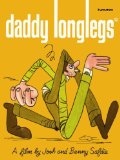| Reviews & Columns |
|
Reviews DVD TV on DVD Blu-ray 4K UHD International DVDs In Theaters Reviews by Studio Video Games Features Collector Series DVDs Easter Egg Database Interviews DVD Talk Radio Feature Articles Columns Anime Talk DVD Savant Horror DVDs The M.O.D. Squad Art House HD Talk Silent DVD
|
DVD Talk Forum |
|
|
| Resources |
|
DVD Price Search Customer Service #'s RCE Info Links |
|
Columns
|
|
|
Daddy Longlegs
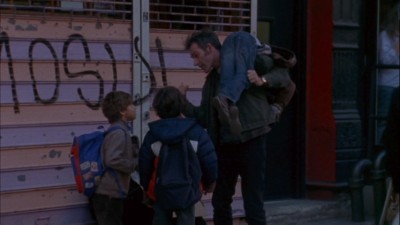
The word "gritty" is frequently used to describe films that have hard-hitting, unpleasant, violent, or grim content, from The French Connection to 8mm. But the other connotation--the one that brought that descriptor to my mind as I watched Josh and Ben Safdie's 2009 film Daddy Longlegs (originally released as Go Get Some Rosemary)--is as in "nitty-gritty," the everyday, supposedly undramatic feel of life events that unusually raw fictional-narrative filmmakers John Cassavetes (Faces) and Maurice Pialat (L'Enfance nue) have pursued, coming up with near-intrusively close-in, unpolished styles in an attempt to bring that feeling to the audience in as unmediated a fashion as possible. The brothers Safdie are telling their own personal, forthrightly part-autobiographical tale in Daddy Longlegs, but the wisdom of their aesthetic choice to follow in the observational, unemphatic, seemingly caught-on-the-fly approach of vérité-style forebears like Cassavetes and Pialat becomes more and more convincing with each passing sequence of the film until, by the time we reach its uncertain, heartbreaking end, it seems like they hit on the perfect and only way to have caught the spirit of their story.
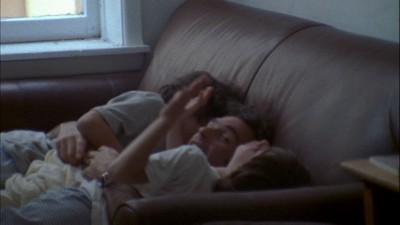
Struggling New York City projectionist Lenny (Ronald Bronstein) only gets custody of his two little boys, Sage and Frey (Sage and Frey Ranaldo, children of Sonic Youth's Lee Ranaldo), for a couple of weeks every once in a while, and it is during one of those two-week periods that the film's action takes place. We first meet Lenny and sons when he picks them up from school at the beginning of their visitation; his jokey but confrontational personality nearly gets him in a fight with their principal, who has had to discipline one of them for aggressive behavior toward another child. This event is indicative of what the visit means for Lenny, who already has a stressed-out personality that swings from affable to put out on a dime and is ill-prepared to deal with the additional responsibility of having his kids. For him, that responsibility means juggling his unpredictable and demanding job, Sage and Frey's school and childcare scheduling, his sort-of but non-exclusive girlfriend, Leni (Eléonore Hendricks, who also starred in the Safdies' highly-touted feature The Pleasure of Being Robbed), his wacky friends and hectic social routines, the disapproval of his ex and the children's mother (Leah Singer, Sage and Frey Ranaldo's real-life mother), and the roughing-it lifestyle of NYC, with its tiny apartments, high costs, crowds and subways, and overall constant struggle for a mere wage-earner to keep his or her head above water.
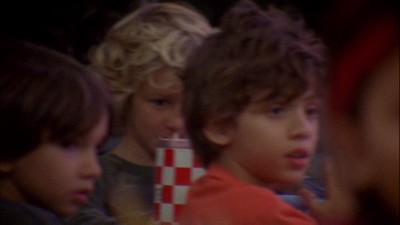
The father and sons' first misadventure is relatively benign, coming in the form of a trip upstate after Lenny invites himself and the kids along when he learns that a one-night stand (Dakota Goldhor) is already heading that way. (Lenny has made no commitments to Leni, despite her supportiveness, her expressed wish to be more involved in his and his children's lives, and how obviously good she is for him, as symbolically attested to by their matching names.) Once they have returned to the city after this lovely rural interlude, however, Lenny's life becomes a series of crises wherein his responses highlight both his sincerely good intentions and his sometimes funny, sometimes scary haplessness when it comes to fathering (already brought to the fore just by the insane inconsistency revealed through his conversations with Sage and Frey, as when he says, "You can hit me all you want, but you don't hit a teacher!"). A misunderstanding over work scheduling means he has to retrieve his kids from school and get them back with him to the projection booth in time to switch reels, and that interval also has to include the time it takes to get chewed out by their mother, who has been called (by the same principal from the beginning of the film) when nobody came to pick them up. Then he's called in to work an all-nighter, and since Leni has to work, too (and a downstairs neighbor has recused himself from any future babysitting duties after the boys deployed a urine-filled spray gun on him when he last watched them), Lenny has the bright idea of smashing up/junior-sizing some of the sleeping pills he sometimes takes and just having Sage and Frey sleep through until he gets back home--a plan that leads to a visit from an appalled doctor friend ("If I weren't your friend, I'd call the police") whose good news is that Lenny is lucky and the kids will only be out for several days before they finally awaken from their dad-induced mini-coma. And none of that is even including Lenny's overnight stint in jail after he goes out for some fun with some pals, one of whom is a graffiti artist (or, from the cops' POV, a vandal)! All of this is surrounded by other, less fraught moments--Lenny interacting in a singularly New York way with the people around him in his fairly rough neighborhood, his trip to a natural history museum with Sage and Frey, and many other intimate little moments of play and fatherly affection and frustration--but Lenny generally appears to lead a fraught existence by design, and whether it's dealing with an emergency or just giving his kids a bath, he seems to be perpetually and cumulatively overwhelmed.
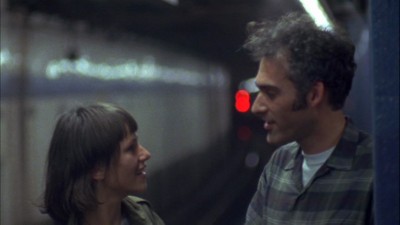
Although it gets us there by giving us plenty of opportunities to get to know Sage and Frey and become emotionally invested in their well-being (and by allowing itself, despite its predominantly handheld, candid-camera look and feel, not to just be slavishly realistic at every moment, allowing for some surreal moments including a playful "magic trick" near the beginning and a surreal, disturbing dream sequence toward the end), the film is on the whole a character study of Lenny. A less serious, personal work would have made this ageing downtown-dweller (played with perfectly calibrated energy by Ronald Bronstein) into a "quirky," extraordinary character, but the Safdies depict him as ordinary in the sense that his quirks are, in a more down-to-earth view, just the kinds of commonplace neuroses and flaws most of us have. Lenny really is just trying to get by, and though we can clearly see that he's barely passable at best as a father, the film's up-close, lived-experience approach makes it impossible to condemn him entirely, or to miss his sincere and real love for his children. The final, ill-advised action that that love leads to closes the film on a melancholy visual high point in a moment of aching poignancy, a poignancy that in the hands of these thoughtful, emotionally astute, inspired filmmakers seems the natural result of their deceptively loose-appearing, actually quite rigorous vérité aesthetic. When the film lets the father and his two sons go for the end credits to come up, it is for us an unsustainable but incredibly moving moment of grace in which we are left truly, irresolubly teetering on the line dividing our inability to condone Lenny's ill-advised, unethical act and our sad knowledge of the true, guileless love and desperation that motivate it.
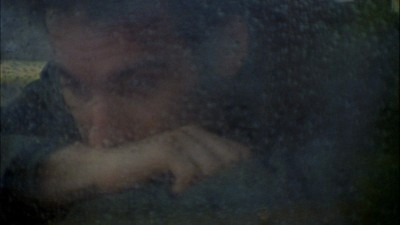
THE DVD:
The transfer (which presents the film anamorphically at its theatrical aspect ratio of 1.78:1) is fantastic. This is a film where "gritty" texture and nuance of color, light, and film grain counts for virtually everything (at least, the movie would not be nearly what it is without them), and it's all there for us to enjoy, free of any artifacts or flaws attributable to the transfer process itself, and resplendent with the physical qualities of celluloid that are underscored when it's used in this particular way, all of which have been meticulously preserved for our home viewing pleasure.
Sound:The Dolby Digital 2.0 stereo soundtrack is well up to the film's direct-sound aesthetic, with everything coming through at the level and in the balance and ratio intended by the Safdies' carefully created lower-fi sound recording/design, which is to say that it's not the most pristine or fancy-sounding picture, but the precise and carefully crafted character of it sound is fully intact here.
Extras:--Missed Header, 90 seconds of footage of the young Josh and Ben Safdie shot by their camcorder-enthusiast father, which opened the film during its theatrical tour and resembles, at least in situation and form, many scenes in Daddy Longlegs.
--Eight deleted scenes contain footage that bridges and expands upon certain plot points and is shot and acted in a way just as appealing as what made it into the final cut. One guesses that these bits simply needed to be trimmed for reasons having to do with the filmmakers' goals for the film's precise flow, structure, and running time.
--A scrapbook-like making-of, the 12-minute The Second Stop from Jupiter, with lots of behind-the-scenes footage, meditative/symbolic drawings associated with the film, and reminiscing narration from actress/artist Leah Singer.
--Go Get Some Rosemary, which repurposes the feature's original title for a minute and a half of footage taken at the first moment when the filmmakers stopped rehearsing with young actors Sage and Frey Ranaldo to hand them over to Ronald Bronstein, their "father" in the film.
--A miscellany of "promo junk" including the Safdie brothers' animated appearance on a cartoon program called "The Randolph Hotel"; Why? (This Movie Exists), a couple minutes of footage of Ben Safdie walking around NYC wearing a sandwich board to advertise the film; the animated short/conceptually adventurous "trailer" for the film, "Looney Lenny"; and alleged footage from CNN France breathlessly celebrity-stalking Josh Safdie, the authenticity of which I could not quite make out.
--The film's Cannes trailer.
--A uniquely designed package that deserves its own mention as an "extra." The cardboard outer sleeve with the evocatively cartoon-like drawing on the front houses a thin plastic case (also with its own unique graphic design) to hold the disc, as well as two booklets, one a reprint of While They're Sleeping Josh Safdie's 'zine containing photos taken by their father of him and brother/co-director Ben Safdie as sleeping children (certainly a direct biographical and stylistic inspiration for the film's story and feel), and the other containing a host of personal and on-set drawings and photos as well as an essay on/appreciation of the film by critic Scott Foundas.
FINAL THOUGHTS:With Daddy Longlegs, the New York-based filmmaking brothers Josh and Ben Safdie (The Pleasure of Being Robbed) prove themselves worthy, committed, and conscientious successors to a true-indie, polish-free, "raw" and "gritty" realism of the type pioneered by John Cassavetes. Many have tried, and most of those have failed (it certainly didn't work 100% of the time, even for Cassavetes himself) to emulate the simple-looking, very challenging (if, that is, one cares about making a good film) handheld/direct-sound/documentary-like Cassavetes aesthetic. But Daddy Longlegs is much less any kind of self-conscious, credibility-borrowing homage or imitation than the finely-honed result of applying just the right style, wherever one has found it, to just the right characters and story. The Safdies have created something so vibrant and alive that the deep, real sadness it leaves you with is not nearly depressing, but instead a cause to celebrate the unexpected heights of emotional power that the film achieves. Highly Recommended.
|
| Popular Reviews |
| Sponsored Links |
|
|
| Sponsored Links |
|
|
| Release List | Reviews | Shop | Newsletter | Forum | DVD Giveaways | Blu-Ray | Advertise |
|
Copyright 2024 DVDTalk.com All Rights Reserved. Legal Info, Privacy Policy, Terms of Use,
Manage Preferences,
Your Privacy Choices | |||||||









